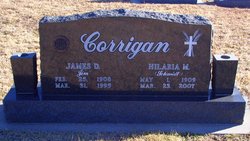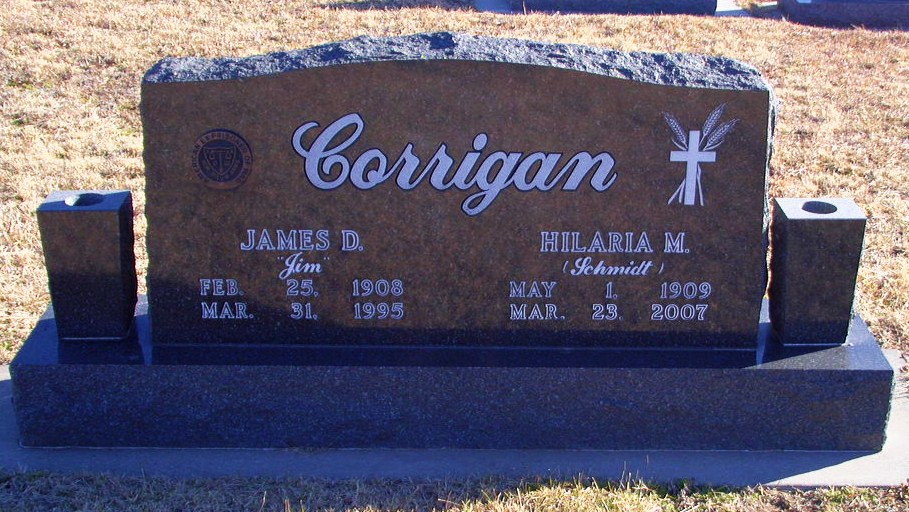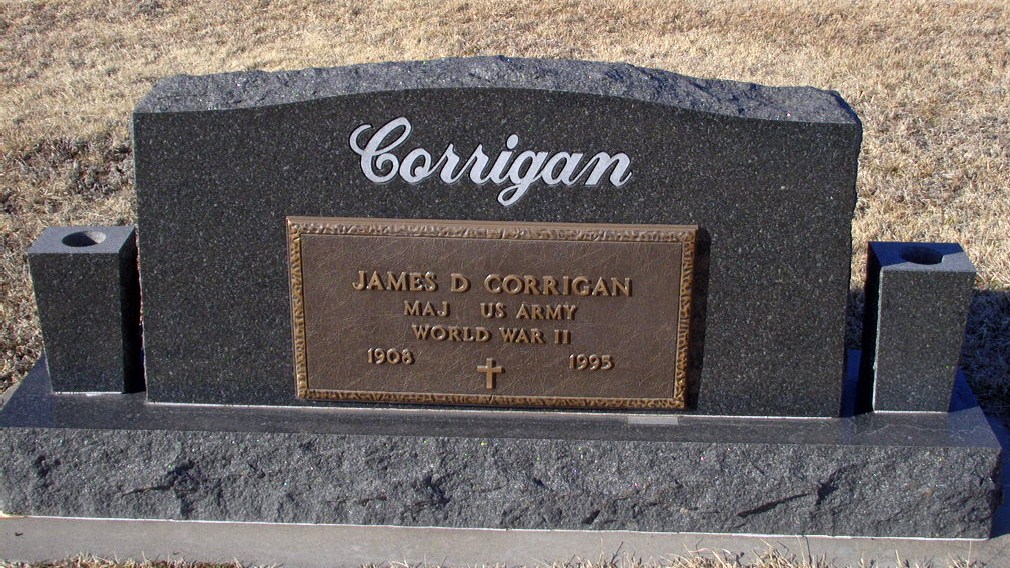"He wasn't the frivolous or wild type, but he just enjoyed life in general." It was the attitude of a man who felt fortunate just to be alive. A survivor of the Bataan Death March during World War II, Mr. Corrigan spent more than three years in a Japanese prisoner-of-war camp.
When the Philippine Islands fell to Japanese forces in April of 1942, an estimated 75, 000 American and Filipino soldiers were forced to march 90 miles across the Bataan peninsula to a Japanese prison camp. By some estimates, 30, 000 of the exhausted and ill soldiers died during the march. Thousands more died of disease, malnutrition, dehydration and torture in Japanese POW camps.
Mr. Corrigan worked in the fields with a group of Dutch doctors, and buried fellow American soldiers who died in captivity ''every day, quite a number of them, " Mrs. Corrigan said. ''He didn't tell me that until I read it in the books, " Mrs. Corrigan said. A robust man of about 180 pounds when healthy, Mr. Corrigan withered to 97 pounds in the miserable conditions of captivity. At one point, he became seriously ill, surviving only because a priest in the camp was able to steal some quinine and save his life.
After being liberated from captivity in late 1945, Mr. Corrigan spent a year recuperating in a Colorado hospital. He eventually moved to Wichita, became an insurance salesman and built a life for himself. His friends even "Smitty, " whom he met and married after the war heard little about what he endured on the death march and in prison. "That was something of a cross he bore rather quietly, " said Bill Hartong, a member with Mr. Corrigan of the Downtown Lions Club.
During a talk about his experiences to the Lions Club a few years ago, Hartong said, Mr. Corrigan's eyes filled with tears and his voice broke. ''It had made an impression on him, it was obvious, " Hartong said.
Mrs. Corrigan remembers telling her husband once about standing in line for a few hours during the war for the opportunity to buy hose at the Woolf Brothers store in Wichita. ''He said, 'Talk about hose, I used to stand in line to get a drink of water, and when you'd get to almost the end of the line, the water was gone, ' " she said. "I never even mentioned anything any more."
Mr. Corrigan supported an effort to raise money for a museum honoring prisoners of war in Andersonville, Ga., the site of a notorious Confederate POW camp during the Civil War. ''As the years go by, if you mention Bataan or Corregidor, people say 'What's that?' " he said in a Wichita Eagle story last year. "They forget, or they never knew."
He was also one of 45 former prisoners of war who were awarded newly minted Prisoner of War Medals in a ceremony at McConnell Air Force Base as part of National POW-MIA Recognition Day in 1988. Mrs. Corrigan still remembers the pride she saw her husband show that day. It was justified, she said. ''That was part of his life, " she said of his wartime ordeal. The couple had no children. A memorial has been established with Church Of The Magdalen.
Wichita Eagle
"He wasn't the frivolous or wild type, but he just enjoyed life in general." It was the attitude of a man who felt fortunate just to be alive. A survivor of the Bataan Death March during World War II, Mr. Corrigan spent more than three years in a Japanese prisoner-of-war camp.
When the Philippine Islands fell to Japanese forces in April of 1942, an estimated 75, 000 American and Filipino soldiers were forced to march 90 miles across the Bataan peninsula to a Japanese prison camp. By some estimates, 30, 000 of the exhausted and ill soldiers died during the march. Thousands more died of disease, malnutrition, dehydration and torture in Japanese POW camps.
Mr. Corrigan worked in the fields with a group of Dutch doctors, and buried fellow American soldiers who died in captivity ''every day, quite a number of them, " Mrs. Corrigan said. ''He didn't tell me that until I read it in the books, " Mrs. Corrigan said. A robust man of about 180 pounds when healthy, Mr. Corrigan withered to 97 pounds in the miserable conditions of captivity. At one point, he became seriously ill, surviving only because a priest in the camp was able to steal some quinine and save his life.
After being liberated from captivity in late 1945, Mr. Corrigan spent a year recuperating in a Colorado hospital. He eventually moved to Wichita, became an insurance salesman and built a life for himself. His friends even "Smitty, " whom he met and married after the war heard little about what he endured on the death march and in prison. "That was something of a cross he bore rather quietly, " said Bill Hartong, a member with Mr. Corrigan of the Downtown Lions Club.
During a talk about his experiences to the Lions Club a few years ago, Hartong said, Mr. Corrigan's eyes filled with tears and his voice broke. ''It had made an impression on him, it was obvious, " Hartong said.
Mrs. Corrigan remembers telling her husband once about standing in line for a few hours during the war for the opportunity to buy hose at the Woolf Brothers store in Wichita. ''He said, 'Talk about hose, I used to stand in line to get a drink of water, and when you'd get to almost the end of the line, the water was gone, ' " she said. "I never even mentioned anything any more."
Mr. Corrigan supported an effort to raise money for a museum honoring prisoners of war in Andersonville, Ga., the site of a notorious Confederate POW camp during the Civil War. ''As the years go by, if you mention Bataan or Corregidor, people say 'What's that?' " he said in a Wichita Eagle story last year. "They forget, or they never knew."
He was also one of 45 former prisoners of war who were awarded newly minted Prisoner of War Medals in a ceremony at McConnell Air Force Base as part of National POW-MIA Recognition Day in 1988. Mrs. Corrigan still remembers the pride she saw her husband show that day. It was justified, she said. ''That was part of his life, " she said of his wartime ordeal. The couple had no children. A memorial has been established with Church Of The Magdalen.
Wichita Eagle
Family Members
Sponsored by Ancestry
Advertisement
Advertisement








